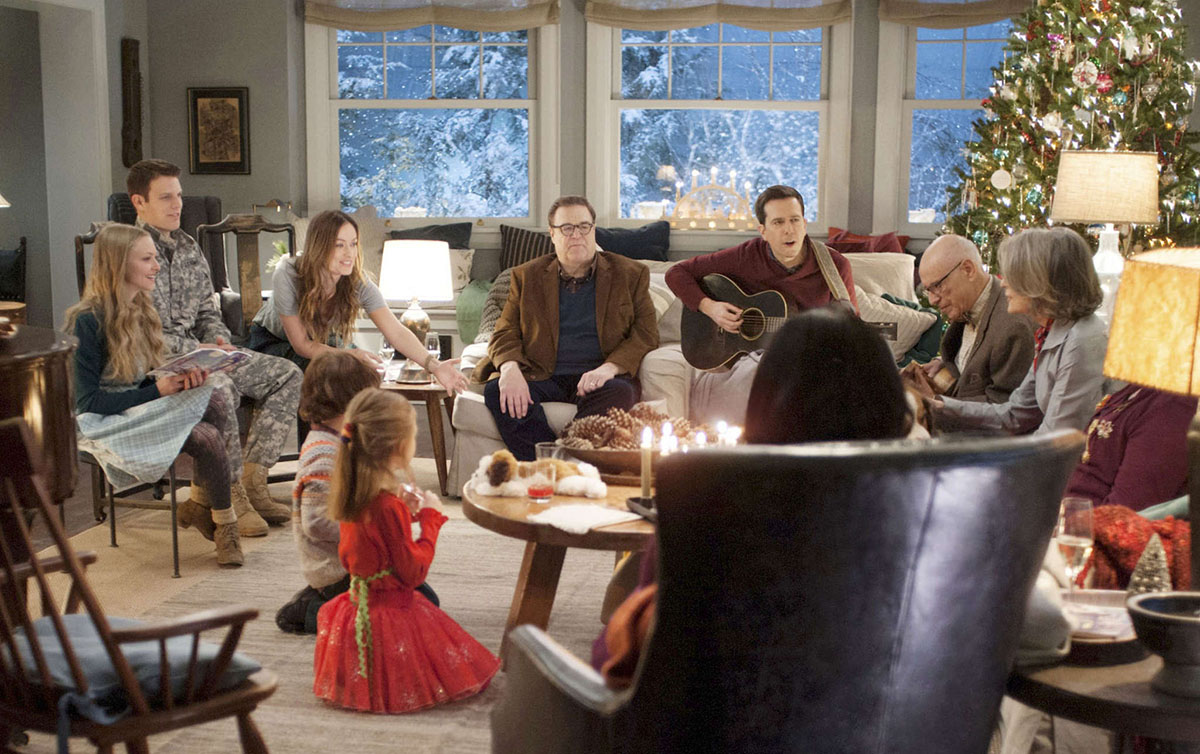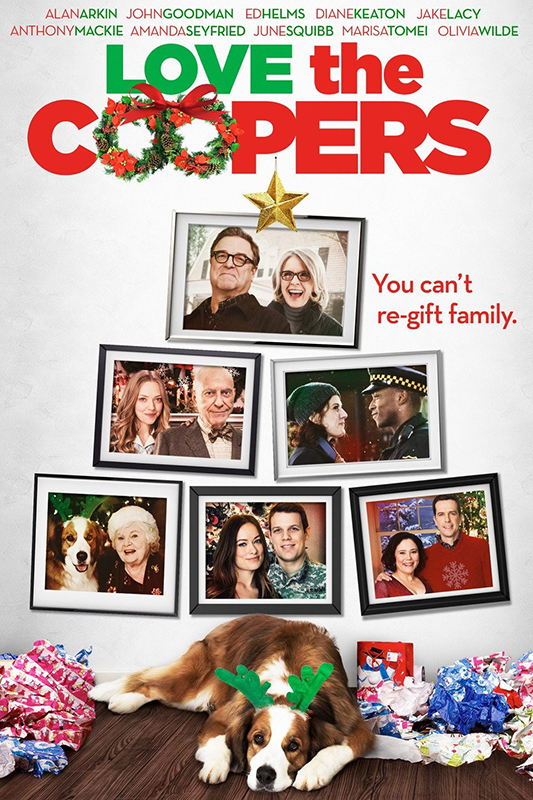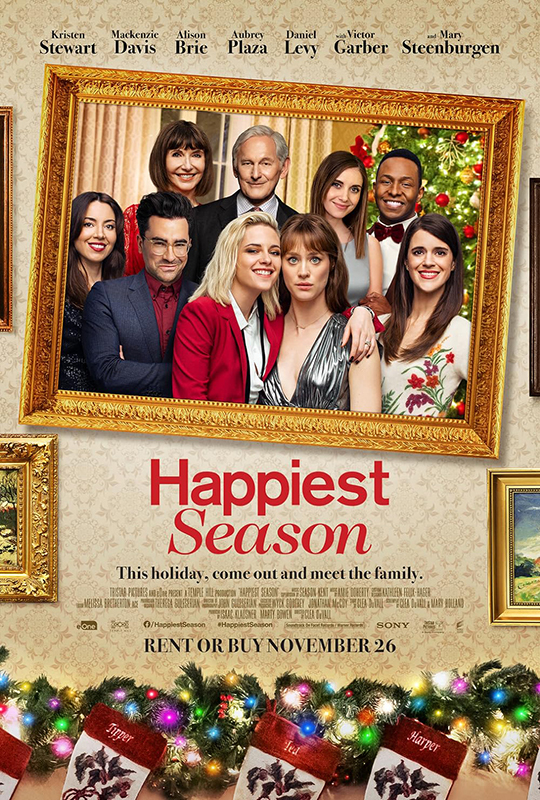
Families can be our best support system, and our biggest source of stress, often at the same time. Two holiday movies filmed in the Burg take this premise, with more twists than Hallmark movies but similarly cozy resolutions.
Reviewed by Jan Hardy, Library Specialist. Screenshot from "Love the Coopers" as featured image.
Love the Coopers (DVD-8257)
Steve Martin, Diane Keaton, John Goodman (2015)
 (Rated PG-13) The sarcastic opening line sets the tone: “Ah, the holidays. The most wonderful time of the year.” Or as Sam (John Goodman) says, “Christmas comes around and somebody yells, ‘Time for comfort and joy’ … Everyone panics, as if you can schedule happiness.”
(Rated PG-13) The sarcastic opening line sets the tone: “Ah, the holidays. The most wonderful time of the year.” Or as Sam (John Goodman) says, “Christmas comes around and somebody yells, ‘Time for comfort and joy’ … Everyone panics, as if you can schedule happiness.”
Yet that’s just what his wife Charlotte (Diane Keaton) tries to do, staging “one last perfect Christmas” before they tell the family they’re splitting up after 40 years. Charlotte and Sam have a daughter Eleanor (Olivia Wilde), who is single, and a son Hank (Ed Helms) who’s divorced. Hank hasn’t told anyone he was laid off from his job taking family portraits at Sears, “making unhappy families appear happy.” Their three children are teenage Charlie (a very young and gawky Timothee Chalamet), little Bo who just wants to make Charlie happy, and cherubic Madison who enjoys blurting out “You’re such a dick!”
Olivia Wilde’s character draws the most interest, flying reluctantly into town and lingering at the airport to put off the inevitable family reunion. She meets Joe (Jake Lacy), who is leaving for his post in the Army, and laments “Doesn’t it suck how we can want to run from our families and impress them at the same time? I just disappoint mine.” Despite the fact that Eleanor’s family says it is “so okay that I’m not in a relationship,” she feels enough pressure to enlist Joe in a “tiny white lie – be my boyfriend for one night.” Joe, the product of a happy family, refuses at first, but finally consents. You can see where this is going, even as Eleanor prods Joe about religion and politics, and gets in a few digs that are really very mean.
Amanda Seyfried appears as Ruby, a waitress who serves the family’s grandfather Bucky (Alan Arkin) in her diner every day. It took me a while to realize that Ruby wasn’t a daughter or family member but a sort of love interest for the much older Bucky. Uh, okay. Marisa Tomei plays Emma, Diane Keaton’s sister, though I think she’s way too young for the role. Emma feels inferior because she, too, is single. She gets caught shoplifting a gift for Charlotte and spends much of the film riding with a cop and counseling him.
The story bounces between the various pairs, their pretenses and competitions. We see snowy Pittsburgh, the Convention Center, PPG Place, Millvale and the “T.” There are funny shots of children crying on Santa’s lap, frowning snowmen, and Santa cookies with, I swear, G-strings. Christmas music pops up often, as well as little homilies: Try and be the person you want to become, and Why waste a moment? We’re here for such a short time. John Goodman and Alan Arkin are always fun to watch. But it doesn’t quite gel, even though everyone seems to be trying very hard.
Happiest Season (BRD-320)
Kristen Stewart, Mackenzie Davis, Mary Steenburgen (2020)
 (Rated PG-13) I don’t like comedies, or romances, or romantic comedies. I wanted to like “Happiest Season” because it’s an LGBTQ holiday movie; according to IMDB.com, director Clea DuVall wrote the film so she could see her own experiences play out on screen. But, dear readers, I could not. The film opens with postcard-like holiday scenes, including the Point and the Duquesne Incline, and then sweeties Abby (Kristen Stewart) and Harper (Mackenzie Davis) stroll through a tour of a festively-lit neighborhood. Abby is “not a huge Christmas person,” having lost her parents ten years ago, but Harper tries to persuade her to love the season. Harper is obliged to visit her parents, and she convinces Abby to come along. “I get to meet the people who made my favorite person,” Abby tells her friend John (Dan Levy, who steals every scene he’s in). In fact, Abby tells John she wants to propose, even to ask Harper’s father for his blessing.
(Rated PG-13) I don’t like comedies, or romances, or romantic comedies. I wanted to like “Happiest Season” because it’s an LGBTQ holiday movie; according to IMDB.com, director Clea DuVall wrote the film so she could see her own experiences play out on screen. But, dear readers, I could not. The film opens with postcard-like holiday scenes, including the Point and the Duquesne Incline, and then sweeties Abby (Kristen Stewart) and Harper (Mackenzie Davis) stroll through a tour of a festively-lit neighborhood. Abby is “not a huge Christmas person,” having lost her parents ten years ago, but Harper tries to persuade her to love the season. Harper is obliged to visit her parents, and she convinces Abby to come along. “I get to meet the people who made my favorite person,” Abby tells her friend John (Dan Levy, who steals every scene he’s in). In fact, Abby tells John she wants to propose, even to ask Harper’s father for his blessing.
Problem is, Harper hasn’t come out to her folks yet, and she has to ask Abby to be closeted as well. Harper’s father (Victor Garber) is running for mayor and needs to project an image of the perfect family, which Harper’s mom (Mary Steenburgen) aggressively shoots and posts on social media. Harper’s sisters have to project family bliss, one sister with husband, daughter and son, and the youngest suppressing her weirdness as much as she can. Throughout, everyone awkwardly refers to Abby as an “orphan.” She’s an object of pity, even though she looks cheerful and capable and is pursuing her Ph.D. in Art History at CMU. “Boy, Carnegie Mellon, huh? Bet you could teach me a thing or two,” Harper’s father says. Absolutely, I thought.
There’s a lot of frantic hiding in metaphorical and actual closets. Harper’s ex-boyfriend shows up, as well as her ex-girlfriend Riley (Aubrey Plaza) who Abby commiserates with in a local gay bar during a drag show. (At this point I was hoping for Abby and Riley to get together; it seemed a more reasonable outcome.) But Harper finally comes to her senses and comes out, her sister admits that she and her husband have separated, and the weird sister Jane claims her rightful place in the family.
There are some highlights - like John asking Abby if she’s “managed to get a man’s permission to take ownership of an adult human woman yet?” and John trying to greet Harper’s old boyfriend with a masculine “‘Sup?” Harper’s youngest sister cracked me up a few times with her descriptions of the science fiction world she was creating. I think a better movie could take Abby, John, the weird younger sister, the ex-girlfriend, and the two drag queens, get them all together in a gay bar and let them improvise. I wonder what Clea DuVall could do with that.
